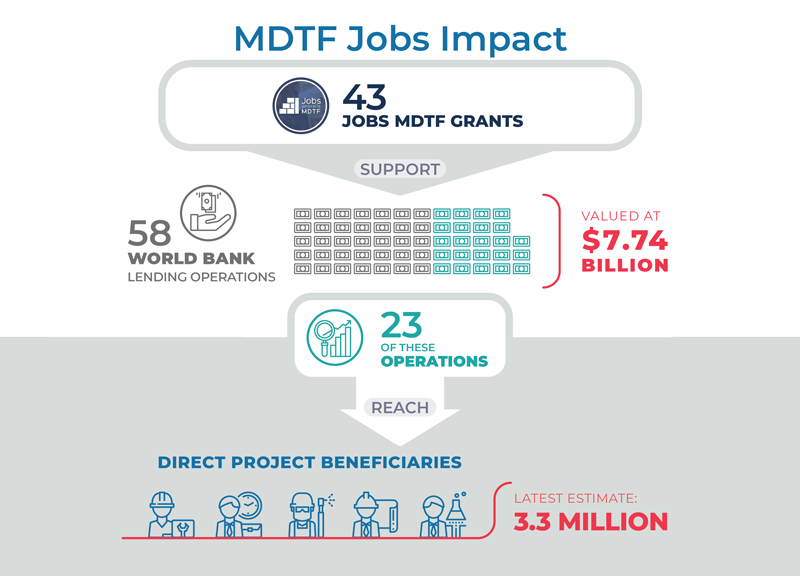The Jobs Umbrella Multidonor Trust Fund (the MDTF) supports countries to design high-impact, multi-sector job creation strategies and advances global knowledge to address the jobs challenge.
Now in the fourth year of MDTF operation, the recently published MDTF Annual Report 2018-2019 shows that substantial ground has been covered to advance the above goals.
Key outcomes include:
Improved jobs policies and programs. Country-level jobs programs have been strengthened by policy dialogue around Jobs Diagnostic(JD) studies in more than 30 countries. MDTF-supported activities have generated fresh insights in key policy areas such as ways to create better-quality jobs for women; social protection for informal sector workers; and opportunities for job creation in high-growth sectors like agribusiness. As part of the jobs agenda, the MDTF has also supported work to adapt social insurance programs to the changing nature of work, which contributed to the World Development Report (WDR) 2019.
Private sector mainstreamed in the jobs agenda. Support to improved private sector jobs outcomes has been a key feature of MDTF activities. The Let’s Work Partnership (LWP) country pilots—implemented in Bangladesh, Mozambique, Tanzania, Tunisia, and Zambia— have brought together governments and private sector actors to focus on improving private sector jobs growth. The LWP is a comprehensive program that includes rigorous country studies, value chain studies, and data analysis of private sector jobs indicators to support policy decisions. The Let’s Work Partnership in Bangladesh influenced key decision makers in the Government of Bangladesh to implement policy reforms for quality jobs.
Designing innovative operations for job creation. MDTF-funded activities have supported new and innovative models of lending operations linked clearly to job outcomes and addressing limitations to better jobs. For instance, in both Tunisia and Côte d’Ivoire, MDTF supports an integrated approach to simultaneously tackle the labor supply and demand constraints to improving jobs outcomes. In Lebanon, the MDTF grant supports the design and evaluation of a multisectoral jobs investment lending project for sustainable private sector job creation in underdeveloped regions with a focus on youth, women, and vulnerable populations, including Syrian refugees.

Stakeholder capacity building. Some highlights in this area include technical assistance to statistics agencies to carry out country studies; support to improved data management capacity; and technical support on value chain analysis. Each year, the Jobs Group organizes the Jobs and Migration Core Course where participants from across the world receive training on conceptual and practical issues involved in the development of programs on social assistance, pensions and social insurance, and jobs and migration.
New approaches to estimating jobs effects. Improving the analysis of jobs challenges and of the effects of public policies and programs has been a central aim of the Jobs MDTF. This is being carried out through toolkits and methodologies such as the Jobs M&E Toolkit, global database on labor market outcomes, and computable general equilibrium (CGE) models.
Improving the evidence base on jobs. The Jobs MDTF conducts rigorous studies to understand and collect evidence on ways to improve jobs outcomes in different settings. This includes addressing the challenges of better jobs for youth and women. Incorporating a gender lens in JDs has been important to identify and address the issue of gender disparities in jobs. For instance, childcare is a key barrier for women who want to work. The MDTF engaged directly with the private sector on this important challenge, supported the Tackling Childcare Report and funded research on employer-supported childcare policies in 50 countries worldwide.
Improved knowledge sharing and leveraging. The Jobs MDTF results framework places knowledge management front and center. New learnings around the jobs agenda are consistently shared on accessible platforms such as the Jobs Data Visualization App, the new Jobs and Development partnership site, and the S4YE partnership site.
